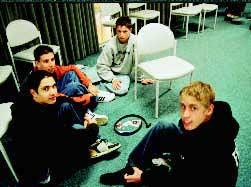Religious Education
T
he year 2002 has been an exciting year on many fronts in terms of Religious Education. This year marked a new beginning in the curriculum of Years 9 and 10 at Trinity College. This is part of the Evangelisation Plan in Religious Education, to enable students to make a personal conversion to Jesus and Christian values through their proclamation of the Gospel. In our society ‘Tradition’ is often regarded as the same as ‘traditionalism’. Far from suggesting an ability to adapt to a changing world, tradition is equated with the opposition to anything new, especially with opposition to progressive social issues or reordering social structures. The fundamental meaning of tradition refers to ‘what is being passed on from others’. Clearly, tradition comes from the past, and at times cannot provide immediate answers to questions that arise in the present. This does not mean, however, the wisdom of the past does not have a role in the present, nor does it mean that tradition must ignore the present. Tradition highlights the fact that we are social beings. We do not start each generation anew but are always dependent on what is being passed on to us. In addition, we respond to what we value, by seeking to pass onto future generations these values with a conviction that they will enrich others. Tradition can be seen as a positive because it demonstrates the social dimension of human beings and the historical nature of human existence implies that not everything we value begins with ourselves. These two facts address the connection between tradition and
Church, for without Christian tradition there can be no Christian theology, no Church. The Church is that group of people who, in response to the Holy Spirit, recognize Jesus Christ as God’s definitive word of self-revelation. The Church exists to be the symbol for the world of the life that God offers in Jesus Christ to all people and all of Creation. Church may be seen as something not only which is living, but also as something which is life giving. The Trinity College Pilgrimage to India must be seen as part of our commitment to Christian Service. This experience was humbling, because it confronted the poverty of others and liberating because in the Church we share in the body of Christ. Amnesty International and the Eddie Rice Outreach are other examples where students of Trinity College are challenged to live out their Christian tradition to ‘love their neighbour’, the living message of Jesus. The Religious Education programme at Trinity College has implemented numerous experiences for students to identify with the living tradition of the Church. Significant liturgical experiences, Eucharist, Retreats, Workshops for Leadership and paraliturgies, compliment classroom learning. Students are given insight into their own self worth, deepening appreciation of others and their understanding of Catholicism and their faith in God. Mr Gerard Theseirra Dean of Religious Education
103






























































